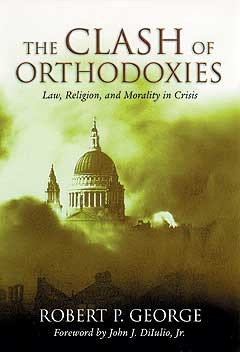Intercollegiate Studies Institute, 2002.
Description from Publisher:
It is a common supposition among many of our cultural elites that a constitutional “wall of separation” between church and state precludes religious believers from bringing their beliefs to bear on public matters. This is because secular liberals typically assume that their own positions on morally charged issues of public policy are the fruit of pure reason, while those of their morally conservative opponents reflect an irrational religious faith. In The Clash of OrthodoxiesRobert George shows that this supposition is wrong on both counts.
Challenging liberalism’s claim to represent the triumph of reason, George argues that on controversial issues like abortion, stem-cell research, euthanasia, homosexuality, and same-sex marriage, traditional Judeo-Christian beliefs are actually rationally superior to secular liberal alternatives. Drawing on the natural law philosophical tradition, George demolishes various secularist pretenses, such as the notion that the very young and very old among us are somehow subpersonal and not worthy of full legal protection. He reveals the dubious person/body dualism implicit in secularist arguments, and he demonstrates the flawed reasoning behind the idea that the state ought to be neutral regarding competing understandings of the nature and value of marriage.
George also revisits the controversy surrounding his participation in the First Things “End of Democracy?” symposium, in which he considered the relevance of Catholic teachings regarding the legitimacy of political regimes to the contemporary American situation. George argues that because natural law and natural rights doctrine lie at the foundation of the American republic, the judicial reading of the Constitution that has undermined democracy in order to enshrine the secularist agenda is deeply flawed.
In advancing his thesis, George argues for a return to old-fashioned liberalism, a worldview that he claims is best exemplified by Pope John Paul II, whose teachings laud democracy, religious liberty, and economic freedom while also recognizing the demands of civil rights, social and economic justice, and the principle of subsidiarity. These demands restrain Catholics—and indeed all people of faith—from making personal freedom an absolute, and George takes to task those political leaders who, though believers, have denied or ignored the political responsibility this entails.
The Clash of Orthodoxies is a profoundly important contribution to our contemporary national conversation about the proper role of religion in politics. The lucid and persuasive prose of Robert George, one of America’s most prominent public intellectuals, will shock secular liberals out of an unwarranted complacency and provide powerful ammunition for embattled defenders of traditional morality.
Table of Contents:
Foreword: Faith, Reason, and Truth John J. DiIulio, Jr.
Preface
The Public Square
1. The Clash of Orthodoxies (Including an exchange with Josh Dever)
2. Liberal Political Theory and the Culture of Death
3. God’s Reasons
4. “Same-Sex Marriage” and “Moral Neutrality”
5. The Concept of Public Morality
6. Making Children Moral: Pornography, Parents, and the Public Interest
The Courts
7. The Tyrant State
8. Justice, Legitimacy, and Allegiance: “The End of Democracy” Symposium Revisited
9. Natural Law and Civil Rights: From Jefferson’s “Letter to Henry Lee” to Martin Luther King’s “Letter from Birmingham Jail”
10. Natural Law, the Constitution, and the Theory and Practice of Judicial Review (Including an exchange with James Fleming)
11. What Is Law? A Century of Arguments
The Church
12. Religious Values and Politics
13. Nature, Morality, and Homosexuality
14. Bioethics and Public Policy: Catholic Participation in the American Debate
15. On Fides et Ratio
Afterword: We Should Not Kill Human Embryos—For Any Reason
Notes
Index
Online:
ISI Books
Amazon
Google Books

